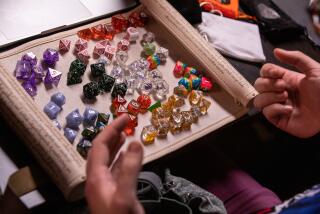Come Into the Online Parlor, Relax With Board Games Like Checkers, Chess
- Share via
The hype surrounding online gaming would have you believe that everything is blast-and-kill action, war strategy or fantasy role-playing games. While those are the most prominent ones online, there is a lesser-known phenomenon that’s growing: old-time card and board games. That’s right, you have the most advanced computing machine on your desktop, you hook to the World Wide Web and you’re playing . . . checkers.
The funny thing is that these low-tech games work a lot better than the fast-trigger games when played on the Net. You don’t have to worry about your connection speed, buying an expensive CD-ROM game or being embarrassed by an overzealous competitor. Instead, you can play games often for free, sometimes without downloads, and you might meet someone interesting or win a prize to boot.
For the record:
12:00 a.m. Oct. 10, 1997 For the Record
Los Angeles Times Friday October 10, 1997 Orange County Edition Calendar Part F Page 35 Entertainment Desk 1 inches; 30 words Type of Material: Correction
Games Web site: An item published in the Cybertainment column in some editions of Thursday’s Calendar Weekend included an incorrect address for the Riddler World Wide Web site. The address is www.riddler.com.
Online parlor games let you unwind and relax, play games without chatting or chat aimlessly during the middle of a game. The pace is much slower, and the pressure to win is much less. For those who still want to be chess champions or Scrabble stars, many services offer competitive “rooms” with rankings and tournaments.
My favorite site for these leisurely games is ClassicGames.com (www.classicgames.com), a simply designed space that uses Java--which means you need not download anything to play. You just have to fill in a brief registration and wait for them to send you a password by e-mail. Then it’s off to a room for traditional games like chess, checkers or poker, or original creations like Hex, Freecell or Wordweb. Though poker can be played with up to 12 players, you can also play a few games solo if you desire.
The only downside to ClassicGames.com is that the Java pages sometimes take pretty long to load initially. Once you’re in a gaming room playing, however, the action is fairly instantaneous. You can either join a game that needs players, or start a game and wait for someone to stop by. Day or night, it seems populated with plenty of friendly characters. Plus, if you just want to watch, you can check out a game in progress and chat up the players.
Another top-notch site is Microsoft’s Internet Gaming Zone (www.zone.com), which unfortunately requires Microsoft’s Internet Explorer browser (because of “technical reasons,” the company says). The Zone does have some twitch action games by Microsoft and LucasArts, but its strongest parts are the eight classic card and board games. You first have to download more than 3MB of special software, and it seems a bit more complicated than necessary.
Once you’re inside the Zone, though, the games and rooms are beautifully designed. You see dozens of “tables” set up with little figures showing who’s waiting for a game. You click on an empty chair and click “start” to get the game going. A game of backgammon was as nicely designed as any full-scale computer game, though the chat function was off when I played.
If you like trivia or yearn for prizes, you might want to check out the Riddler (www.ridler.com). You fill out an extensive questionnaire and can play Checkered Flag (multi-player crossword) or Mental Floss (pop-culture trivia) for modest prizes like caps and T-shirts. The games are a bit more imaginative, and you’re bombarded with advertising, but it’s free and quite challenging.
If you have kids who’d like to play online, you might want to join the NetPlay Game Club (www.netplay.com), which promises safe gaming for children. There are “angels” who check rooms to make sure no one’s acting up, and kids can send pictures of themselves so others can see them when they play.
Mark Glaser is a San Francisco-based freelance writer and critic. You can reach him at McGlaze@aol.com.


